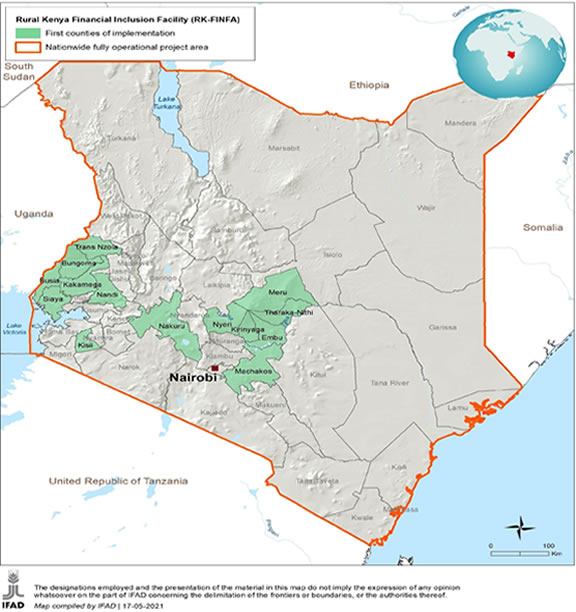Background
Rural Kenya Financial Inclusion Facility (RK-FINFA)
RK-FINFA is a six-year (2022-2028) development project financed by the Government of Kenya (GoK) and the International Fund for Agricultural Development (IFAD). The project supports the transformation of the rural and smallholder agriculture sector through private sector-led development by improving the access of smallholder farmers and rural micro, small and medium-sized enterprises to appropriate financial services.
The total project cost is US$ 134.05 million, in which IFAD financing constitutes US$ 22 million while the rest will be co-financed from domestic sources as follows: the national government – US$ 24 million in cash and in kind, domestic financing institutions is US$ 85.75 million - mainly through the leverage in loan guarantee operations, and the co-financing from non-government sector implementing partners – US$ 2.3 million.
Institutional framework
The lead implementing agency of RK-FINFA is the Directorate of Budget, Fiscal and Economic Affairs in the National Treasury and Economic Planning (NT&EP). The Directorate is headed by a Director General who is answerable to the Principal Secretary of the NT&EP. The Project Management Unit (PMU) of RK-FINFA is established at the NT&EP, under the Financial and Sectoral Affairs Department.
The sub-components of the project are implemented by intermediaries or investing partner institutions, representing public, private and non-government organizations. Thus, while the lead agency of the project is the National Treasury, all RK-FINFA activities include pro-active co-operations with the private sector, including financial institutions, the farming community as well as micro, small and medium enterprises and larger processing and marketing companies in key agricultural value chains.
Project goal
To reduce poverty, enhance climate change adaptation and improve livelihoods in rural areas
Development Objective
To increase rural financial inclusion and green investments by agriculture value chain stakeholders, leading to equitable employment opportunities, innovative and resilient production systems, and increased incomes for smallholders, poor and marginalized rural households, women, and youth.
Target Population
The project is expected to benefit 190,000 rural Kenyan households, comprising both direct and indirect beneficiaries. Direct beneficiaries are 66,000 economically active smallholder households and 2,000 rural MSMEs engaged in smallholder-inclusive value chains who will direct financial and technical services.
Indirect outreach of the project includes an estimated 32,000 persons through employment in the RK-FINFA-supported agribusinesses and farms as well as 90,000 smallholder households through participation in the value chains strengthened by the supported agribusinesses.
The targeting focus is on low-income, economically active rural households, with specific targets on 50 percent of women and 30 percent of youth participation in both capacity building and financing activities.
Project Area
The geographic coverage of RK-FINFA, once fully operational, will be nationwide. However, the project’s entry point is the following counties with ongoing IFAD-funded projects: Bungoma, Busia, Embu, Kakamega, Kirinyaga, Kisii, Machakos, Meru, Nakuru, Nandi, Nyeri, Siaya, Tharaka Nithi and Trans-Nzoia.

